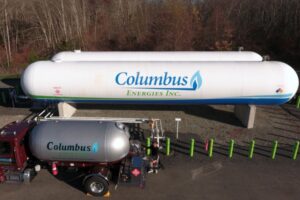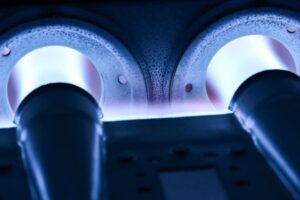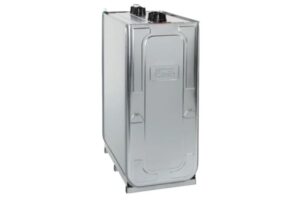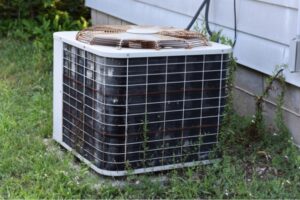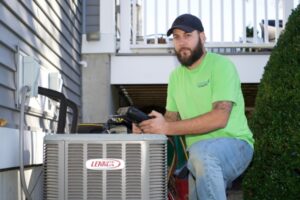9 Must-Have Features To Look For In A Power Generator

Contents
- 1 Top 9 Critical Features to Evaluate in a Power Generator
- 1.1 1. Standby Power Output and Capacity
- 1.2 2. Fuel Type and Efficiency of Whole-House Generators
- 1.3 3. Power Generator Automatic Transfer Switch (ATS) Integration
- 1.4 4. Backup Generator Sound Levels
- 1.5 5. Sizing Your Whole-House Generator
- 1.6 6. Standby Generator Activation Systems
- 1.7 7. Generator Operating Duration and Fuel Capacity
- 1.8 8. Safety Essentials for Whole-House Generators
- 1.9 9. Generator Maintenance and Warranty Coverage
- 2 Final Thoughts
- 3 Contact Columbus Energies for Professional Backup Generator Services
In areas frequently affected by power outages caused by severe weather or other factors, having a dependable power generator is essential, not merely for comfort but for essential needs. It guarantees an uninterrupted electricity supply, safeguarding against the hassles and possible harm caused by unexpected power failures. Selecting the best standby generator with the appropriate attributes improves its effectiveness and dependability and prolongs its operational life.
Columbus Energies stands as a frontrunner in delivering top-tier whole-house generators and is renowned for our expertise and extensive selection of products. This article will outline the nine essential features to consider in a power generator, ensuring you make an informed decision tailored to your requirements.
Explore Our Whole-House Generator Solutions! Find the ideal generator tailored to your home’s needs. Contact Columbus Energies today to learn more about our extensive product lineup.
Top 9 Critical Features to Evaluate in a Power Generator
Below, we explore key elements to consider when selecting a whole-house generator.
1. Standby Power Output and Capacity
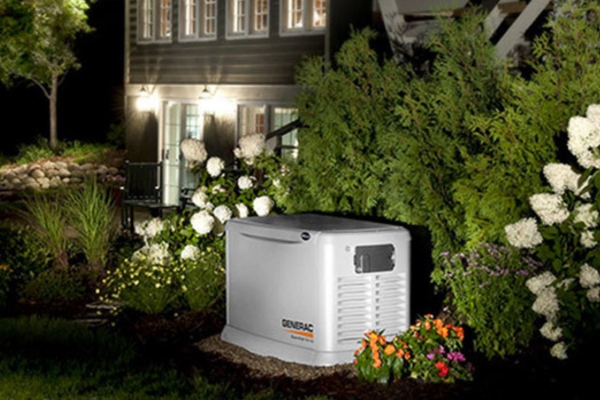
The power output and capacity are vital when selecting a power generator. These metrics determine the electricity a generator can supply, typically quantified in watts. Each home appliance and system demands a certain wattage; for example, a refrigerator might require 600 watts, and a central air conditioning system up to 4000 watts. It’s crucial that the generator’s capacity surpasses the combined wattage demands of all household appliances and systems during peak operation to ensure efficient functionality.
To calculate the required power output for your home, sum the wattage needs of all devices that must remain operational during a power outage. When evaluating generators, you’ll encounter models with capacities from 5,000 to over 20,000 watts. A modest-sized home with fewer appliances may suffice with a 10,000-watt model. At the same time, a more expansive residence equipped with extensive systems would likely need a minimum of 20,000 watts to maintain a continuous power supply during disruptions.
Consult with Our Generator Specialists! Need assistance setting up a whole-house generator? Contact Columbus Energies for expert advice and thorough explanations.
2. Fuel Type and Efficiency of Whole-House Generators
Selecting the fuel type for a generator is a critical decision that influences everything from its efficiency to ongoing operational expenses. The most common fuel options are gasoline, diesel, propane, and natural gas. Each option has its benefits and factors to consider; for instance, diesel generators are celebrated for their durability and strong performance, whereas natural gas units are preferred for their convenience and reduced emissions.
The fuel efficiency of a generator significantly impacts its operational costs and running time. More efficient models generate more electricity using less fuel, proving economical in the long run. While gasoline generators might be cheaper initially, they typically incur higher operational costs and have shorter lifespans. Although cleaner than diesel and gasoline, propane models necessitate safe fuel storage.
Each fuel type presents unique pros and cons, making it essential to select one that aligns with your specific requirements, availability, and environmental impact considerations.
3. Power Generator Automatic Transfer Switch (ATS) Integration
Incorporating an Automatic Transfer Switch (ATS) is essential for maintaining uninterrupted power during an outage. It promptly recognizes a loss of power and swiftly activates the generator within seconds to ensure a smooth shift from the primary power source to the generator. This capability removes the need for manual startup, providing instant alleviation from power interruptions.
Adding an ATS enhances convenience and safety, reducing the impact of outages and safeguarding electronic appliances from damages linked to abrupt power changes. Most contemporary generators are equipped with an ATS that is pre-installed and tailored to function in sync with the generator’s specific output and characteristics. This arrangement ensures that the generator activates only as needed, improving fuel efficiency and prolonging the unit’s lifespan.
Stay Powered with Columbus Energies! Searching for reliable power solutions? Contact Columbus Energies to discover how our whole-house generators can ensure your home operates seamlessly.
4. Backup Generator Sound Levels
When choosing a backup generator, the noise level is a significant factor, particularly in residential settings where excessive noise can interrupt daily activities and breach local sound regulations.
Generators are measured in decibels (dB), with standard models typically ranging from about 60 dB (equivalent to a normal conversation) to over 100 dB (similar to the sound of a nearby motorcycle).
Familiarity with decibel ratings is crucial for selecting a generator that minimizes disturbance. For example, models engineered for quieter performance may incorporate sound-reducing technologies and specialized enclosures that greatly diminish noise emissions. These quieter variants are especially advantageous in densely populated neighborhoods or in homes where noise is a concern for comfort and tranquility.
Opting for a generator with low noise output ensures that your power backup does not contribute to noise pollution, maintaining a peaceful environment.
5. Sizing Your Whole-House Generator

Selecting the appropriate size for a whole-house generator is essential to manage your power requirements effectively. The size of a generator is usually indicated in kilowatts (kW), which directly influences the number of appliances and systems it can support at once.
For example, a smaller residence might be well-served by a 10 kW generator to maintain critical appliances. In comparison, a larger home equipped with multiple air conditioners and a well pump may require a generator with at least 20 kW capacity to manage all potential demands comfortably.
Generators are available in various sizes to meet diverse residential and commercial requirements. The typical size range includes:
- 10 kW models for basic emergency power.
- 20-30 kW models suited for medium-sized homes.
- 40-50 kW units are intended for larger properties or homes with substantial power needs.
Choosing a generator that fits your home’s size ensures efficient performance without the risk of overloading and protects the generator and your household appliances.
Book Your Consultation Now! Prepare for uninterrupted power at home. Contact Columbus Energies today to discover our comprehensive whole-house generator options.
6. Standby Generator Activation Systems
The activation method of a standby generator greatly influences its ease of use and dependability. Popular types are manual start, automatic start, and remote start systems. Generators with a manual start need direct interaction to activate, which may be inconvenient during adverse weather or when the user is away from the property.
Automatic start systems engage automatically when they detect a power outage, ensuring a smooth transition without requiring any action from the user. Remote start enables control of the generator from afar, which is particularly useful for large estates or individuals who face mobility challenges.
The selection of a start-up mechanism should be tailored to the user’s preferences and specific requirements. An automatic start is ideal for maintaining the operation of essential medical equipment or for those who are frequently away from home. On the other hand, manual systems might be more appropriate for budget-conscious users with fewer critical power needs.
Aligning the start-up mechanism with the user’s lifestyle and demands can significantly enhance the generator’s effectiveness and user satisfaction.
7. Generator Operating Duration and Fuel Capacity
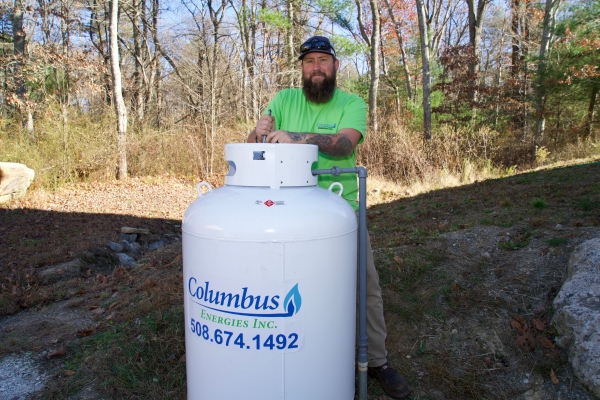
Extended operating durations in generators are essential during prolonged power outages, ensuring uninterrupted performance without the need for constant refueling—a significant benefit in severe weather conditions or periods of fuel shortages. The duration a generator can run continuously primarily depends on its fuel tank capacity; larger tanks enable the generator to operate longer between refills, reducing inconvenience during critical times.
For instance, a 500-gallon propane tank can support several days of generator use, whereas a 20-gallon gasoline tank may require daily refueling under heavy load. Boosting run time and efficiency is possible through eco-mode settings, which adjust output according to demand, and routine care such as oil checks and air filter cleaning, extending the generator’s lifespan and effectiveness.
Secure Your Home’s Power Supply! Keep your home protected against unexpected outages. Reach out to Columbus Energies today to select the ideal whole-house generator explicitly tailored to your requirements.
8. Safety Essentials for Whole-House Generators
Generator safety features are vital for preventing hazards and damage. Essential protections include low-oil shutdown, which stops the engine if oil levels drop too low, preventing mechanical issues. Overload protection ensures the generator shuts off if demand surpasses its limits, safeguarding the unit and appliances. Spark arrestors further enhance safety by capturing sparks from exhaust emissions, significantly reducing fire risks.
Verifying your generator complies with safety guidelines and local codes is essential for secure, lawful operation. Certification from reputable organizations such as Underwriters Laboratories (UL) or the Environmental Protection Agency (EPA), based on fuel type, ensures adherence to critical safety standards.
To improve safety further, install carbon monoxide detectors near the generator and within your home to promptly alert residents of hazardous emissions. Regular upkeep, sufficient ventilation, and proper installation at safe distances from windows and vents are also key practices that ensure the safe operation of backup generators, protecting your home and family.
9. Generator Maintenance and Warranty Coverage

The simplicity of maintenance significantly impacts the long-term dependability of whole-house generators. Models built with easily accessible parts and straightforward maintenance tasks enable efficient routine inspections and repairs, minimizing downtime and prolonging the generator’s life. Regular upkeep, including oil changes, coolant level checks, and belt and battery inspections, greatly improves generator performance and reliability.
Warranty protection is equally essential when selecting a backup generator. Opt for warranties that offer extensive, long-term coverage and strong customer support. Robust warranties cover manufacturing defects and reflect the manufacturer’s trust in their products.
Combining practical maintenance with reliable warranty coverage ensures your generator operates effectively for years, maximizing both peace of mind and return on investment.
Final Thoughts
Choosing the ideal generator requires evaluating key factors like power capacity, fuel options, noise levels, sizing, activation type, runtime, safety components, ease of care, and warranty coverage. Familiarizing yourself with these considerations helps you select a reliable and efficient generator tailored precisely to your needs.
Reach out to Columbus Energies to get expert guidance and browse a selection of premium generators featuring these essential qualities. Secure continuous power and comfort during outages by partnering with Columbus Energies to find the optimal generator solution for your home or business.
Maintain Power Through Every Outage: Contact Columbus Energies now for high-quality standby generator options that deliver dependable energy whenever it matters most!
Contact Columbus Energies for Professional Backup Generator Services
Columbus Energies specializes in high-quality whole-house generator solutions across Southeastern Massachusetts and the Rhode Island region. Our skilled, certified technicians deliver exceptional installation, repairs, and upkeep for standby generators.
Whether you require a new generator installation, dependable repairs, or routine inspections to keep your current unit performing reliably, our experts tailor their approach to your specific requirements. At Columbus Energies, we prioritize delivering responsive generator services at competitive prices.
When you partner with us, you can count on professional workmanship, courteous and knowledgeable staff, and transparent pricing every time. Your satisfaction drives our service, so we confidently guarantee all our work. Contact Columbus Energies today to schedule your appointment and arrange an in-home consultation. Call us now!
Beyond whole-house generator installation, we offer fuel delivery and a comprehensive range of HVAC services to elevate your home’s comfort, indoor air quality solutions, and energy efficiency. Our services include expert heating and cooling system tune-ups, repairs, installations, and more. Don’t hesitate to call Columbus Energies today for your home comfort needs!
Contact us now by calling (508) 674-1492 to speak to one of our home comfort specialists!

Related Articles:
